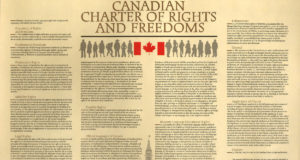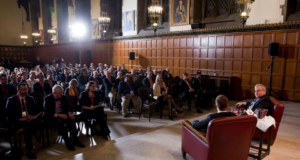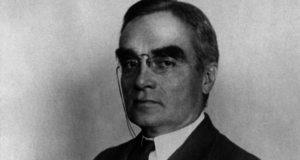In a guest post on the Double Aspect Blog over the Christmas break, Professor Bruce Pardy (Queen’s Law) picked the Supreme Court’s decision in Andrews as one of the worst decisions since 1967. While I believe Professor Pardy offered some important criticisms of the Court in his post, I must respectfully disagree with his attack on the Andrews decision and ...
Read More »Articles
Unearthing Canadian Originalism: Reflections on my Conversation with Justice Stratas
Earlier this month, I had the true privilege of taking part in a discussion with Justice David Stratas of the Federal Court of Appeal, who is one of Canada’s most prominent jurists, on the subject of statutory and constitutional interpretation. The conversation was part of the Runnymede Society’s annual Law & Freedom Conference. Justice Stratas and I covered a lot ...
Read More »The “Cultural Appropriation” Criticism: Lousy Analogy and Censorship in Disguise
On October 23, alongside my colleagues Konstantia Koutouki of University of Montreal, as well as Safie Diallo and Alexandra Lorange, I partook in a discussion initiated by the McGill Runnymede Society, on the criticism of cultural appropriation in the arts and literature. In preparation for this discussion, I discovered more problems with the notion of cultural appropriation than time would ...
Read More »Understanding Unconstitutionality
The following is an excerpt from Mr. Peltomaa’s recently published text, Understanding Unconstitutionality: How a Country Lost its Way. Courts are often said to “strike down” laws that conflict with the Constitution. An image is evoked of black-robed judges hurling bolts of lightning in Zeus-like manner, thereby destroying the legal efficacy of unconstitutional laws and expunging them from the ...
Read More »Protecting Rights: A Common Responsibility
“Are great public problems best addressed through institutions designed to apply the explicit technical knowledge of experts or by those designed to channel the implicit social knowledge of the community?”[1] Since the enactment of the Charter of Rights and Freedoms, Canada has experienced a remarkable shift from the latter forum to the former—namely, from legislature to courtroom.[2] Not only has ...
Read More »Constitutionalism from the Cave
The imbroglio with the Ontario legislature’s enactment of Bill 5 to restructure the Toronto City Council a couple of months before an upcoming election, the Superior Court’s declaration of that legislation unconstitutional, the threatened invocation of the “notwithstanding clause” to override that declaration, and the Court of Appeal’s restoration of what little sanity could still be restored by reversing the Superior ...
Read More »Political Costs as Control on the Notwithstanding Clause
The notwithstanding clause saga brought about by the Ford government is difficult for those born and bred on Supreme Court precedent. Law students are presented with an idea of the courts as benevolent actors of the public trust, hemming in cavalier legislatures acting on the passions of citizens. The saga, though, forces us to reckon with another sort of control ...
Read More »Why ARL is Seeking Leave to Intervene in the Standard of Review Appeals
On August 30, 2018, Advocates for the Rule of Law brought a motion for intervention at the Supreme Court of Canada in three appeals: Minister of Citizenship and Immigration v Vavilov,[i] Bell Canada v. Canada (Attorney General),[ii] and National Football League v. Canada (Attorney General).[iii] In a rare move, the Court’s judgment granting leave to appeal elaborated as follows: The ...
Read More »The Original “Living Tree”
One of the main arguments in Canada in favour of the “living tree” is that it has deep roots in our constitutional tradition. As the Supreme Court of Canada said in Reference Re Same Sex Marriage, the living tree is “one of the most fundamental principles of Canadian constitutional interpretation.”[1] The argument goes something like this: beginning with the famous ...
Read More »Deference and Delegation As Fickle Bedfellows
The administrative state, the supposed sword of progressives, is not necessarily so. In many countries, the administrative state was constituted on the urging of progressives to advance a social justice agenda. In the United States, progressive reformers during the New Deal era sought to make government a “prescriptive entity” designed to advance certain progressive goals. Executive orders reached a “heyday” during ...
Read More » Advocates for the Rule of Law
Advocates for the Rule of Law









